2nd Digital Literacy & Panchayat Summit
Empowering Rural Panchayat through Digital Literacy Programme

Session Focus:
- To build a strong case & compelling advocacy for maximizing adoption of wireless technologies for rural empowerment and enable delivery of content and services to reach masses.
- How panchayats can become two-way platform to provide e-governance services through digital inclusion
- How to improve efficiency and functioning of Panchayats with information and content resource platform
- Using digital Panchayats to facilitate deployment of rural citizen services delivery through digital means
- Roadmap to generate social, cultural and economic advantages for every Panchayat with a two way information and content gateway.
Session Speakers
Moderator: Osama Manzar, Founder & Director, Digital Empowerment Foundation (DEF)
Key Panelists
- N. Ravi Shankar, MD, BBNL & Administrator, USOF, DOT, MOCIT
- Dr. Govind, Ceo, National Internet Exchange Of India (NIXI)
- Anoop Singh, Spl Secretary, Information Technology & Communication, Government Of Andhra Pradesh
- Debjani Ghosh, Managing Director, Intel
- Rita Soni, CEO, NASSCOM
- Rajen Varada, Director, Technology For The People
Session Summary
Mr. Manzar, Founder & Director, DEF initiated the session by asking people from the Arain block, Ajmer, to share their views about digital literacy and what has been there experiences with the internet so ar. It is important to note that Arain is one of the three places where NOFN has been implemented first. One of the teachers appointed to educate girls in this block shared that it was indeed a great initiative from Govt. but he faced some difficulties in teaching girls, who hadn’t even seen a computer before in their lives, about internet. He then sharedthe story that when his maid saw him teach Internet to girls, she also urged to learn and has been learning the basics of Computers & Internet for the past 2 months. Mr. Manzar then turned to the people from Panisagar (North Tripura) the second place to receive the NOFN line. One gentleman from the group literally blessed Internet for giving the exposure of world, whichthe people from Panisagar had never had before. While he originally thought the Internetwasa waste of time, he shared that he now feels it is a great medium for awareness. Another girl from the group sharedthat she was very keen to learn computer from an initial age but could not do so due to circumstances. But when this project reached their village, she readily grabbed the opportunity. She now has a mail address& a Facebook account. She thanked the DEF for enabling them to learn and help them to get access to computers & Internet.
A gentleman from Kutch, Gujarat shared his experience as to how his organization did a pilot with almost 50 panchayat members and gave them modular training for 6 months. The most important component was to mainstream ICT into panchayat working system. As a result of this training, after 6 months those members have created a network on Facebook. They now use Skype regularly. Also his organization has developed an application called as LGSS i.e. Local Government Support System. Using this application these people have now started doing budgeting and planning for their areas.
The Gram Pradhan of a village from Varanasi also shared his views. He told everyone that when his village first got their website with the help of DEF, many other village sarpanch called him up to get their villages on the website as well. He added that each and every villager has been proud of this achievement. In fact they have received a grant of Rs 2 Crores from Govt. to promote this digital literacy in villages. Mr. Manzarpointed that each gram panchayat must come up with a website to share all of their works, their super visionary acts, new Govt. schemes etc. which would bring a revolution in terms of transparency in governance.
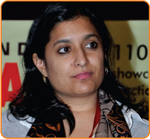 Ms. Rita Soni, CEO, NASSCOM took the mike. She first of all apologized to all for not being able to communicate in Hindi and asked Osama sir to translate for her. She commended all the members from the panchayat across the country for their accomplishments in the field of digital literacy. She suggested 3 points to improve upon it. Firstly she said that Digital Literacy is bound to happen, with or without the corporates. Secondly, after having created such awareness we need to devise ways in which we can leverage this knowledge. Lastly she said that being able to use the judge mental aspect while using the internet was very crucial.
Ms. Rita Soni, CEO, NASSCOM took the mike. She first of all apologized to all for not being able to communicate in Hindi and asked Osama sir to translate for her. She commended all the members from the panchayat across the country for their accomplishments in the field of digital literacy. She suggested 3 points to improve upon it. Firstly she said that Digital Literacy is bound to happen, with or without the corporates. Secondly, after having created such awareness we need to devise ways in which we can leverage this knowledge. Lastly she said that being able to use the judge mental aspect while using the internet was very crucial.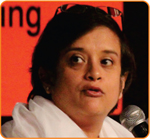 Ms. Debjani Ghosh from Intel shared that she was very delighted to know that almost everyone in the audience was very well aware of the benefits of computer and Internet and they should in fact stop thinking about how to explain the benefits of computer to the rural people. Instead they should focus upon providing the systems into their hands as soon as possible. She then concluded by giving a brief introduction about Intel’s pilot project in the three districts in India.
Ms. Debjani Ghosh from Intel shared that she was very delighted to know that almost everyone in the audience was very well aware of the benefits of computer and Internet and they should in fact stop thinking about how to explain the benefits of computer to the rural people. Instead they should focus upon providing the systems into their hands as soon as possible. She then concluded by giving a brief introduction about Intel’s pilot project in the three districts in India.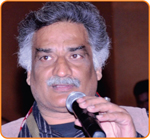 Next Mr. Rajnikant Dwivedi, Founder – HWA (UP) thanked the Government and Corporate partners of the program for launching such an initiative. He expressed immense joy in glorifying the development of Varanasi in digitizing the panchayat. He also informed that as many as 4500+ women have received digital literacy and are now economically settled. The development of the website for local crafts industry under the supervision of DEF is yet another achievement. These people have now recognized the benefits of internet and are now actively using and promoting it.
Next Mr. Rajnikant Dwivedi, Founder – HWA (UP) thanked the Government and Corporate partners of the program for launching such an initiative. He expressed immense joy in glorifying the development of Varanasi in digitizing the panchayat. He also informed that as many as 4500+ women have received digital literacy and are now economically settled. The development of the website for local crafts industry under the supervision of DEF is yet another achievement. These people have now recognized the benefits of internet and are now actively using and promoting it.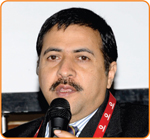 Later Mr. Anoop Singh, Spl. Secretary – Information Technology & Communication, Government of Andhra Pradesh shared that he was delighted to meet people from numerous states all at one platform and said that he was feeling quiet home like. He narrated one of his experiences from his early days and said that literacy was necessary, irrespective of how quickly does digital literacy grows. He also pointed out that we need to use technology for fulfilling our needs first and nothing else. We need to have content which is very much relevant to us. This will help us improve transparency and development. This was in fact very important to truly strengthen the independence of India.
Later Mr. Anoop Singh, Spl. Secretary – Information Technology & Communication, Government of Andhra Pradesh shared that he was delighted to meet people from numerous states all at one platform and said that he was feeling quiet home like. He narrated one of his experiences from his early days and said that literacy was necessary, irrespective of how quickly does digital literacy grows. He also pointed out that we need to use technology for fulfilling our needs first and nothing else. We need to have content which is very much relevant to us. This will help us improve transparency and development. This was in fact very important to truly strengthen the independence of India. Mr. Manzar invited Dr. Govind, CEO – National Internet Exchange of India (NIXI) to share his views. Getting directly to the point, he said that the NIXI has been developing the system so that panchayat across India can create websites in their vernacular languages including Hindi. In fact they have developed portalcalled .bharat typically for panchayat in India and the services would be available very soon.
Mr. Manzar invited Dr. Govind, CEO – National Internet Exchange of India (NIXI) to share his views. Getting directly to the point, he said that the NIXI has been developing the system so that panchayat across India can create websites in their vernacular languages including Hindi. In fact they have developed portalcalled .bharat typically for panchayat in India and the services would be available very soon.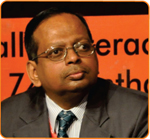 Mr. N. Ravi Shankar – MD, BBNL & Administrator, USOF, DoT, MoCIT explained in very simple words as to how 58 panchayat in India today are connected to 100 mbps speed and each every panchayat would be covered under the NOFN scheme very soon. He urged all the members of the rural local governments to get strengthened up and use this technology and opportunity to grow their incomes and level of prosperity. He assured that within next one or one and half year they would implement the scheme across the nation. Even alternative source of energy would be set up in places where there is a shortage of power supply. He then went out to explain the importance of NOFN as impeccable from of infrastructure. He concluded by saying that it is a partnership of everyone and this so called highway can lead the way to development in every sphere.
Mr. N. Ravi Shankar – MD, BBNL & Administrator, USOF, DoT, MoCIT explained in very simple words as to how 58 panchayat in India today are connected to 100 mbps speed and each every panchayat would be covered under the NOFN scheme very soon. He urged all the members of the rural local governments to get strengthened up and use this technology and opportunity to grow their incomes and level of prosperity. He assured that within next one or one and half year they would implement the scheme across the nation. Even alternative source of energy would be set up in places where there is a shortage of power supply. He then went out to explain the importance of NOFN as impeccable from of infrastructure. He concluded by saying that it is a partnership of everyone and this so called highway can lead the way to development in every sphere. Mr. Dinesh Tyagi, CEO – Common Service Center project of the Union Government, took charge and shared that he is determined to setup 1 internet kiosk per 6 villages in every state of the nation and as such is targeting setting up 1 lakh such kiosks. Mr. Tyagi said that it was his very chance to interact with the rural citizens. Different states have implemented this scheme with different names. He traced the origin of the Digital Literacy program back in the 1990 in the state of Kerala and explained that how that program has become a unique example.Mr. Tyagi then told everyone that the major difference which Digital Literacy can create is in terms of opportunities. Researches have long ago proved that there exists no difference in the level of intelligence of rural or urban citizen. The difference, if any, exists only in terms of opportunity which Digital Literacy is believed to correct. The NOFN scheme will lay a virtual highway that would lead to increased level of education and thus further improve the opportunities for the rural India.
Mr. Dinesh Tyagi, CEO – Common Service Center project of the Union Government, took charge and shared that he is determined to setup 1 internet kiosk per 6 villages in every state of the nation and as such is targeting setting up 1 lakh such kiosks. Mr. Tyagi said that it was his very chance to interact with the rural citizens. Different states have implemented this scheme with different names. He traced the origin of the Digital Literacy program back in the 1990 in the state of Kerala and explained that how that program has become a unique example.Mr. Tyagi then told everyone that the major difference which Digital Literacy can create is in terms of opportunities. Researches have long ago proved that there exists no difference in the level of intelligence of rural or urban citizen. The difference, if any, exists only in terms of opportunity which Digital Literacy is believed to correct. The NOFN scheme will lay a virtual highway that would lead to increased level of education and thus further improve the opportunities for the rural India.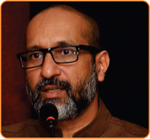 Later Mr. Rajen Varda, Director, Technology for People initiated his address with the very famous quote from Neil Armstrong: “a small step for a man but a giant step for the mankind”. The small steps that these panchayat have taken are going to make a giant impact on the Indian society in a similar way. He stressed on making connectivity of panchayat a must goal for all. Mr. Varda said that the best practices and the inspiring stories of panchayat should be properly documented and be shared with those who haven’t adopted the Digital Literacy till date.
Later Mr. Rajen Varda, Director, Technology for People initiated his address with the very famous quote from Neil Armstrong: “a small step for a man but a giant step for the mankind”. The small steps that these panchayat have taken are going to make a giant impact on the Indian society in a similar way. He stressed on making connectivity of panchayat a must goal for all. Mr. Varda said that the best practices and the inspiring stories of panchayat should be properly documented and be shared with those who haven’t adopted the Digital Literacy till date.